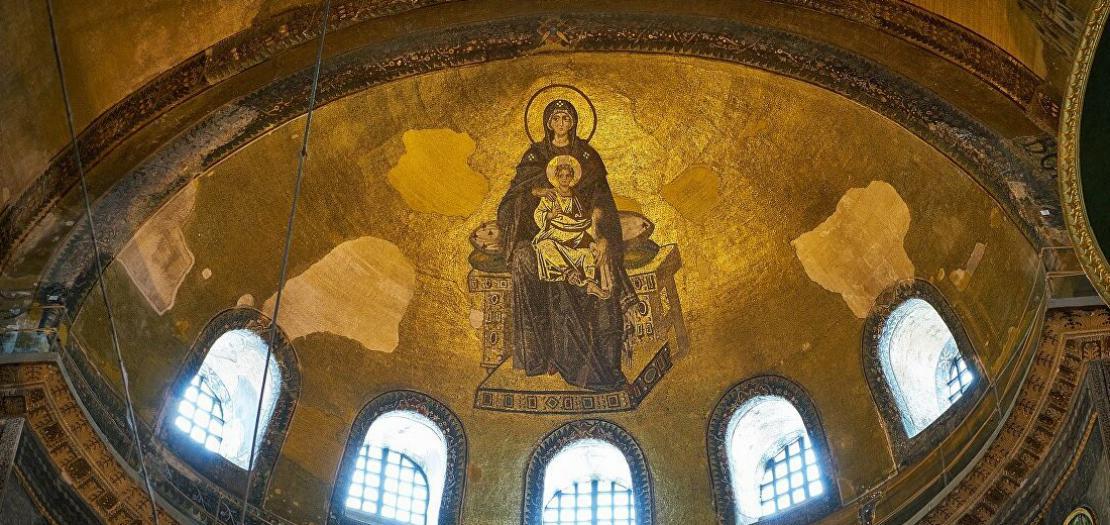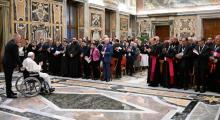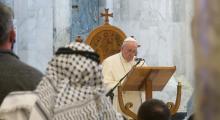Issued by the Catholic Center for Studies and Media - Jordan. Editor-in-chief Fr. Rif'at Bader - موقع أبونا abouna.org

The world-famous Hagia Sophia, originally founded as an Orthodox Christian cathedrals 1,500 years ago, has been turned back into a mosque. This position was announced on Friday, July 10, by Turkish President Recep Tayyip Erdogan basing his decision on a court ruling that annulled the site's museum status.
There have been numerous reactions opposing this measure by Church leaders, the European Union, Cyprus, the United States of America, Greece and Russia. They strongly condemned Turkey's actions on Hagia Sophia terming it as “an effort to distract domestic opinion” calling on Turkey to respect its international obligations. They also termed the measure as “an open provocation to the civilized world “as it does not bring nations together, but on the contrary brings them into collision.”
The United Nations Educational, Scientific and Cultural Organization (UNESCO) issued a statement saying it was "regrettable that the Turkish decision was not the subject of dialogue nor notification beforehand".
"UNESCO calls on the Turkish authorities to open a dialogue without delay in order to avoid a step back from the universal value of this exceptional heritage whose preservation will be reviewed by the World Heritage Committee in its next session," the United Nation's cultural body said in a statement.
Following is the text of the statement:
The Director-General of UNESCO deeply regrets the decision of the Turkish authorities, made without prior discussion, to change the status of Hagia Sophia. This evening, she shared her serious concerns with the Ambassador of Turkey to UNESCO.
Hagia Sophia is part of the Historic Areas of Istanbul, a property inscribed on UNESCO’s World Heritage List. “Hagia Sophia is an architectural masterpiece and a unique testimony to interactions between Europe and Asia over the centuries. Its status as a museum reflects the universal nature of its heritage, and makes it a powerful symbol for dialogue,” said Director-General Audrey Azoulay.
This decision announced today raises the issue of the impact of this change of status on the property’s universal value. States have an obligation to ensure that modifications do not affect the Outstanding Universal Value of inscribed sites on their territories. UNESCO must be given prior notice of any such modifications, which, if necessary, are then examined by the World Heritage Committee.
UNESCO also recalls that the effective, inclusive and equitable participation of communities and other stakeholders concerned by the property is necessary to preserve this heritage and highlight its uniqueness and significance. The purpose of this requirement is to protect and transmit the Outstanding Universal Value of heritage, and it is inherent to the spirit of the World Heritage Convention.
These concerns were shared with the Republic of Turkey in several letters, and again yesterday evening with the representative of the Turkish Delegation to UNESCO. It is regrettable that the Turkish decision was made without any form of dialogue or prior notice. UNESCO calls upon the Turkish authorities to initiate dialogue without delay, in order to prevent any detrimental effect on the universal value of this exceptional heritage, the state of conservation of which will be examined by the World Heritage Committee at its next session.
“It is important to avoid any implementing measure, without prior discussion with UNESCO, that would affect physical access to the site, the structure of the buildings, the site’s moveable property, or the site’s management,” stressed Ernesto Ottone, UNESCO’s Assistant Director-General for Culture. Such measures could constitute breaches of the rules derived from the 1972 World Heritage Convention.







